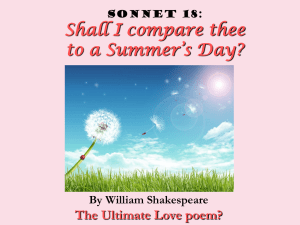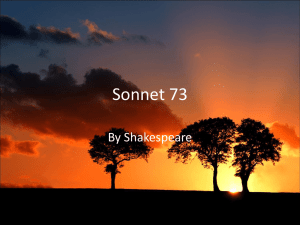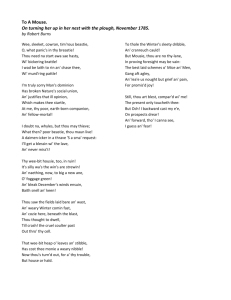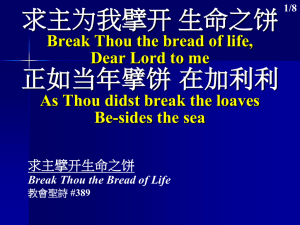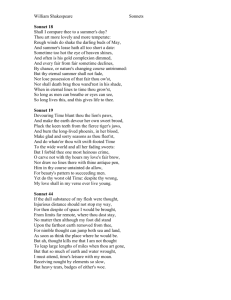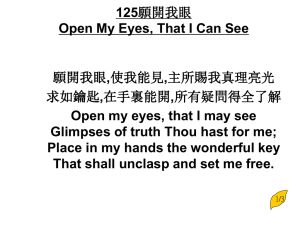My Papa`s Waltz
advertisement
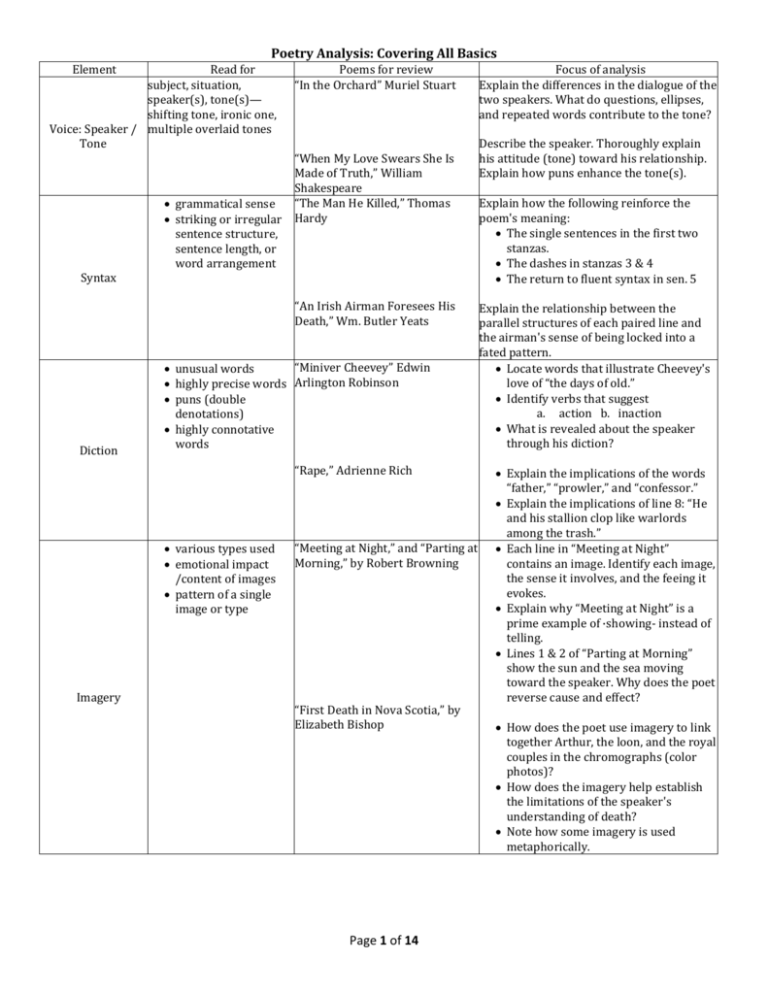
Poetry Analysis: Covering All Basics Element Read for subject, situation, speaker(s), tone(s)— shifting tone, ironic one, Voice: Speaker / multiple overlaid tones Tone Syntax grammatical sense striking or irregular sentence structure, sentence length, or word arrangement Poems for review “In the Orchard” Muriel Stuart “When My Love Swears She Is Made of Truth,” William Shakespeare “The Man He Killed,” Thomas Hardy “An Irish Airman Foresees His Death,” Wm. Butler Yeats Diction “Miniver Cheevey” Edwin unusual words highly precise words Arlington Robinson puns (double denotations) highly connotative words “Rape,” Adrienne Rich various types used emotional impact /content of images pattern of a single image or type Imagery “Meeting at Night,” and “Parting at Morning,” by Robert Browning “First Death in Nova Scotia,” by Elizabeth Bishop Page 1 of 14 Focus of analysis Explain the differences in the dialogue of the two speakers. What do questions, ellipses, and repeated words contribute to the tone? Describe the speaker. Thoroughly explain his attitude (tone) toward his relationship. Explain how puns enhance the tone(s). Explain how the following reinforce the poem's meaning: The single sentences in the first two stanzas. The dashes in stanzas 3 & 4 The return to fluent syntax in sen. 5 Explain the relationship between the parallel structures of each paired line and the airman's sense of being locked into a fated pattern. Locate words that illustrate Cheevey's love of “the days of old.” Identify verbs that suggest a. action b. inaction What is revealed about the speaker through his diction? Explain the implications of the words “father,” “prowler,” and “confessor.” Explain the implications of line 8: “He and his stallion clop like warlords among the trash.” Each line in “Meeting at Night” contains an image. Identify each image, the sense it involves, and the feeing it evokes. Explain why “Meeting at Night” is a prime example of ·showing- instead of telling. Lines 1 & 2 of “Parting at Morning” show the sun and the sea moving toward the speaker. Why does the poet reverse cause and effect? How does the poet use imagery to link together Arthur, the loon, and the royal couples in the chromographs (color photos)? How does the imagery help establish the limitations of the speaker's understanding of death? Note how some imagery is used metaphorically. Element Figurative Language Read for images used metaphorically or symbolically (as similes, “ metaphors, personification etc.) something talked about in terms of something else Sound Rhythm Structure Poems for review “It Sifts from Leaden Selves,” Emily Dickenson “That Time of Year Thou Mayst in Me Behold,” William Shakespeare “Sound and Sense,” by Alexander rhyme Pope alliteration assonance identify places where the poem's music is “In the Valley of Elwy,” Gerard most expressive Manley Hopkins significance of the pace in the lines noticeable shifts or breaks in the pace or meter type of form open (how is the poem organically structured? What devices lend it structure?) closed (identify form—sonnet etc.) how does the form shape the thought and emotion “My Papa's Waltz” Theodore Roethke Focus of analysis Identify the literal and figurative components of all of the implied metaphors (the literal meaning of the metaphors is only labeled “it”). Note the literal images and explain how they become metaphorical. Explain the poem's extended metaphors. Identify lines in which Pope uses sound devices to accomplish what he asserts in line 4: “the sound must seem an echo to the sense.” What contrast is described and imitated in sound effects in lines 5-6, 7-8, and between lines 8-10 and 1112? What is the cumulative effect of the sound devices for the poem's meaning? What is the significance of the lack of sound devices in line 11? How does the rhythm reflect the poem's content? “The Tyger” and “The Lamb,” by William Blake “The Tyger” employs the trochaic foot while “The Lamb” employs the anapestic foot. Explain how each poem's meaning is reflected in the type of meter employed. “That Time of Year Thou Mayst in Note Shakespearean and Petrarchan forms. Me Behold” and “In the Valley of How does the type of sonnet employed Elwy” shape the thought and emotional content of each poem? “When I heard the Learned Astronomer,” Walt Whitman What in the syntax of the first four lines is different from the last four lines? Why can “The Flea,” John Donne this be considered a structural device? Justify the poem’s divisions into three stanzas. Why are the last three lines of each stanza indented? Page 2 of 14 In the Orchard by Muriel Stuart Voice: Speaker / Tone (subject, situation, speaker(s), tone(s)—shifting tone, ironic one, multiple overlaid tones): Explain the differences in the dialogue of the two speakers. What do questions, ellipses, and repeated words contribute to the tone? 'I thought you loved me.' 'No, it was only fun.' 'When we stood there, closer than all?' 'Well, the harvest moon Was shining and queer in your hair, and it turned my head.' 'That made you?' 'Yes.' 'Just the moon and the light it made Under the tree?' 'Well, your mouth, too.' 'Yes, my mouth?' 'And the quiet there that sang like the drum in the booth. You shouldn't have danced like that.' 'Like what?' 'So close, With your head turned up, and the flower in your hair, a rose That smelt all warm.' 'I loved you. I thought you knew I wouldn't have danced like that with any but you.' 'I didn't know, I thought you knew it was fun.' 'I thought it was love you meant.' 'Well, it's done.' 'Yes, it's done. I've seen boys stone a blackbird, and watched them drown A kitten... it clawed at the reeds, and they pushed it down Into the pool while it screamed. Is that fun, too?' 'Well, boys are like that... Your brothers...' 'Yes, I know. But you, so lovely and strong! Not you! Not you!' 'They don't understand it's cruel. It's only a game.' 'And are girls fun, too?' 'No, still in a way it's the same. It's queer and lovely to have a girl...' 'Go on.' 'It makes you mad for a bit to feel she's your own, And you laugh and kiss her, and maybe you give her a ring, But it's only in fun.' 'But I gave you everything.' 'Well, you shouldn't have done it. You know what a fellow thinks When a girl does that.' 'Yes, he talks of her over his drinks And calls her a--' 'Stop that now, I thought you knew.' 'But it wasn't with anyone else. It was only you.' 'How did I know? I thought you wanted it too. I thought you were like the rest. Well, what's to be done?' 'To be done' 'Is it all right?' 'Yes.' 'Sure?' 'Yes, but why?' 'I don't know, I thought you were going to cry. You said you had something to tell me.' 'Yes, I know. It wasn't anything really... I think I'll go.' 'Yes, it's late. There's thunder about, a drop of rain Fell on my hand in the dark. I'll see you again At the dance next week. You're sure that everything's right?' 'Yes,' 'Well, I'll be going.' 'Kiss me...' 'Good night.' ... 'Good night.' Page 3 of 14 5 10 15 20 25 30 35 Sonnet #138 by William Shakespeare Voice: Speaker / Tone (subject, situation, speaker(s), tone(s)—shifting tone, ironic one, multiple overlaid tones): Describe the speaker. Thoroughly explain his attitude (tone) toward his relationship. Explain how puns enhance the tone(s). When my love swears that she is made of truth I do believe her, though I know she lies, That she might think me some untutor'd youth, Unlearned in the world's false subtleties. Thus vainly thinking that she thinks me young, Although she knows my days are past the best, Simply I credit her false-speaking tongue: On both sides thus is simple truth suppress'd. But wherefore says she not she is unjust? And wherefore say not I that I am old? O, love's best habit is in seeming trust, And age in love loves not to have years told: 5 10 Therefore I lie with her and she with me, And in our faults by lies we flatter'd be. The Man He Killed By Thomas Hardy Syntax (grammatical sense, striking or irregular sentence structure, sentence length, or word arrangement): Explain how the following reinforce the poem's meaning: The single sentences in the first two stanzas The dashes in stanzas 3 & 4 The return to fluent syntax in stanza 5 "Had he and I but met By some old ancient inn, We should have sat us down to wet Right many a nipperkin1! "But ranged as infantry, And staring face to face, I shot at him as he at me, And killed him in his place. "He thought he'd 'list2, perhaps, Off-hand like — just as I — Was out of work — had sold his traps3 — 15 No other reason why. 5 "I shot him dead because — Because he was my foe, 10 Just so: my foe of course he was; That's clear enough; although "Yes; quaint and curious war is! You shoot a fellow down You'd treat if met where any bar is, Or help to half-a-crown." 20 ______ 1. 2. 3. Page 4 of 14 a liquor container or vessel with a capacity of a half pint or less. contraction for enlist contraction for trappings An Irish Airman foresees his Death by W.B. Yeats (1865–1939). The Wild Swans at Coole. 1919. Syntax (grammatical sense, striking or irregular sentence structure, sentence length, or word arrangement): Explain the relationship between the parallel structures of each paired line and the airman's sense of being locked into a fated pattern. I KNOW that I shall meet my fate Somewhere among the clouds above; Those that I fight I do not hate Those that I guard I do not love; My country is Kiltartan Cross, 5 My countrymen Kiltartan’s poor, No likely end could bring them loss Or leave them happier than before. Nor law, nor duty bade me fight, Nor public man, nor cheering crowds, 10 A lonely impulse of delight Drove to this tumult in the clouds; I balanced all, brought all to mind, The years to come seemed waste of breath, A waste of breath the years behind 15 In balance with this life, this death. Page 5 of 14 Miniver Cheevy by E.A. Robinson Diction (unusual words, highly precise words, puns (double denotations), highly connotative words: Locate words that illustrate Cheevey's love of “the days of old.” Identify verbs that suggest action and inaction. What is revealed about the speaker through his diction? Miniver Cheevy, child of scorn, Grew lean while he assailed the seasons; He wept that he was ever born, And he had reasons. Miniver loved the days of old When swords were bright and steeds were prancing; The vision of a warrior bold Would set him dancing. Miniver sighed for what was not, And dreamed, and rested from his labors; He dreamed of Thebes and Camelot, And Priam's neighbors. 5 10 Miniver mourned the ripe renown That made so many a name so fragrant; He mourned Romance, now on the town, And Art, a vagrant. 15 Miniver loved the Medici, Albeit he had never seen one; He would have sinned incessantly Could he have been one. 20 Miniver cursed the commonplace And eyed a khaki suit with loathing; He missed the mediæval grace Of iron clothing. Miniver scorned the gold he sought, But sore annoyed was he without it; Miniver thought, and thought, and thought, And thought about it. 25 Miniver Cheevy, born too late, Scratched his head and kept on thinking; Miniver coughed, and called it fate, And kept on drinking. 30 Page 6 of 14 Rape by Adrienne Rich, from DIVING INTO THE WRECK Diction (unusual words, highly precise words, puns (double denotations), highly connotative words: Explain the implications of the words “father,” “prowler,” and “confessor.” Explain the implications of line 8: “He and his stallion clop like warlords among the trash.” There is a cop who is both prowler and father: he comes from your block, grew up with your brothers, had certain ideals. You hardly know him in his boots and silver badge, on horseback, one hand touching his gun. 5 You hardly know him but you have to get to know him: he has access to machinery that could kill you. He and his stallion clop like warlords among the trash, his ideals stand in the air, a frozen cloud from between his unsmiling lips. 10 And so, when the time comes, you have to turn to him, the maniac's sperm still greasing your thighs, your mind whirling like crazy. You have to confess to him, you are guilty of the crime of having been forced. 15 And you see his blue eyes, the blue eyes of all the family whom you used to know, grow narrow and glisten, his hands types out the details and he wants them all but the hysteria in your voice pleases him best. 20 You hardly know him but now he thinks he knows you: he has taken down your worst moment on a machine and filed it in a file. He knows, or he thinks he knows, how much you imagined; he knows, or thinks he knows, what you secretly wanted. 25 He has access to machinery that could get you put away; and if, in the sickening light of the precinct, and if, in the sickening light of the precinct, your details sound like a portrait of your confessor, will you swallow, will you deny them, will you lie your way home? 30 Page 7 of 14 Robert Browning (1812 – 1889) Imagery: various types used, emotional impact /content of images, pattern of a single image or type Each line in “Meeting at Night” contains an image. Identify each image, the sense it involves, and the feeing it evokes. Explain why “Meeting at Night” is a prime example of showing instead of telling. Lines 1 & 2 of “Parting at Morning” show the sun and the sea moving toward the speaker. Why does the poet reverse cause and effect? Meeting at Night The grey sea and the long black land; And the yellow half-moon large and low; And the startled little waves that leap In fiery ringlets from their sleep, As I gain the cove with pushing prow, And quench its speed i' the slushy sand. 5 Then a mile of warm sea-scented beach; Three fields to cross till a farm appears; A tap at the pane, the quick sharp scratch And blue spurt of a lighted match, And a voice less loud, thro' its joys and fears, Than the two hearts beating each to each! 10 Parting at Morning Round the cape of a sudden came the sea, And the sun look'd over the mountain's rim: And straight was a path of gold for him, And the need of a world of men for me. First Death In Nova Scotia by Elizabeth Bishop Imagery: various types used, emotional impact /content of images, pattern of a single image or type How does the poet use imagery to link together Arthur, the loon, and the royal couples in the chromographs (color photos)? How does the imagery help establish the limitations of the speaker's understanding of death? Note how some imagery is used metaphorically. In the cold, cold parlor my mother laid out Arthur beneath the chromographs: Edward, Prince of Wales, with Princess Alexandra, and King George with Queen Mary. Below them on the table stood a stuffed loon shot and stuffed by Uncle 5 Page 8 of 14 Arthur, Arthur's father. Since Uncle Arthur fired a bullet into him, he hadn't said a word. He kept his own counsel on his white, frozen lake, the marble-topped table. His breast was deep and white, cold and caressable; his eyes were red glass, much to be desired. "Come," said my mother, "Come and say good-bye to your little cousin Arthur." I was lifted up and given one lily of the valley to put in Arthur's hand. Arthur's coffin was a little frosted cake, and the red-eyed loon eyed it from his white, frozen lake. Arthur was very small. He was all white, like a doll that hadn't been painted yet. Jack Frost had started to paint him the way he always painted the Maple Leaf (Forever). He had just begun on his hair, a few red strokes, and then Jack Frost had dropped the brush and left him white, forever. The gracious royal couples were warm in red and ermine; their feet were well wrapped up in the ladies' ermine trains. They invited Arthur to be the smallest page at court. But how could Arthur go, clutching his tiny lily, with his eyes shut up so tight and the roads deep in snow? 10 15 20 25 30 35 40 45 50 Page 9 of 14 It Sifts from Leaden Sieves - (291) By Emily Dickinson Figurative Language: images used metaphorically or symbolically (as similes, metaphors, personification etc.)—something talked about in terms of something else Identify the literal and figurative components of all of the implied metaphors (the literal meaning of the metaphors is only labeled “it”). It sifts from Leaden Sieves It powders all the Wood. It fills with Alabaster Wool The Wrinkles of the Road It makes an even Face Of Mountain, and of Plain Unbroken Forehead from the East Unto the East again It reaches to the Fence It wraps it Rail by Rail Till it is lost in Fleeces It deals Celestial Vail To Stump, and Stack - and Stem A Summer’s empty Room Acres of Joints, where Harvests were, Recordless, but for them - 5 10 15 It Ruffles Wrists of Posts As Ankles of a Queen Then stills it’s Artisans - like Ghosts Denying they have been - Page 10 of 14 That time of year thou mayst in me behold (Sonnet 73) by William Shakespeare Figurative Language: images used metaphorically or symbolically (as similes, metaphors, personification etc.)—something talked about in terms of something else Note the literal images and explain how they become metaphorical. Explain the poem's extended metaphors. Structure: type of form, open: organically structured, closed: has a particular form—sonnet etc. Note Shakespearean and Petrarchan forms. How does the type of sonnet employed shape the thought and emotional content of each poem? That time of year thou mayst in me behold When yellow leaves, or none, or few, do hang Upon those boughs which shake against the cold, Bare ruined choirs, where late the sweet birds sang. In me thou see'st the twilight of such day As after sunset fadeth in the west; Which by and by black night doth take away, Death's second self, that seals up all in rest. In me thou see'st the glowing of such fire, That on the ashes of his youth doth lie, As the deathbed whereon it must expire, Consumed with that which it was nourished by. This thou perceiv'st, which makes thy love more strong, To love that well which thou must leave ere long. 5 10 In the Valley of the Elwy by Gerard Manley Hopkins (1844–89). Poems. 1918. Sound: rhyme, alliteration, assonance, identify places where the poem's music is most expressive What is the cumulative effect of the sound devices for the poem’s meaning? What is the significance of the lack of sound devices in line 11? Structure: type of form, open: organically structured, closed: has a particular form—sonnet etc. How does the form shape the thought and emotion? Note Shakespearean and Petrarchan forms. How does the type of sonnet employed shape the thought and emotional content of each poem? I REMEMBER a house where all were good To me, God knows, deserving no such thing: Comforting smell breathed at very entering, Fetched fresh, as I suppose, off some sweet wood. That cordial air made those kind people a hood All over, as a bevy of eggs the mothering wing Will, or mild nights the new morsels of spring: Why, it seemed of course; seemed of right it should. Lovely the woods, waters, meadows, combes, vales, All the air things wear that build this world of Wales; Only the inmate does not correspond: God, lover of souls, swaying considerate scales, Complete thy creature dear O where it fails, Being mighty a master, being a father and fond. Page 11 of 14 5 10 Sound and Sense by Alexander Pope Sound: rhyme, alliteration, assonance, identify places where the poem's music is most expressive Identify lines in which Pope uses sound devices to accomplish what he asserts in line 4: “the sound must seem an echo to the sense.” True ease in writing comes from art, not chance, As those move easiest who have learned to dance. 'Tis not enough no harshness gives offense, The sound must seem an echo to the sense: Soft is the strain when Zephyr gently blows, And the smooth stream in smoother numbers flows; But when loud surges lash the sounding shore, The hoarse, rough verse should like the torrent roar; When Ajax strives some rock's vast weight to throw, The line too labors, and the words move slow; Not so, when swift Camilla scours the plain, Flies o'er the unbending corn, and skims along the main. Hear how Timotheus' varied lays surprise, And bid alternate passions fall and rise! 5 10 My Papa’s Waltz By Theodore Roethke Rhythm: significance of the pace in the lines, noticeable shifts or breaks in the pace or meter How does the rhythm reflect the poem’s content? The whiskey on your breath Could make a small boy dizzy; But I hung on like death: Such waltzing was not easy. We romped until the pans Slid from the kitchen shelf; My mother’s countenance Could not unfrown itself. The hand that held my wrist Was battered on one knuckle; At every step you missed My right ear scraped a buckle. You beat time on my head With a palm caked hard by dirt, Then waltzed me off to bed Still clinging to your shirt. Page 12 of 14 Rhythm: significance of the pace in the lines, noticeable shifts or breaks in the pace or meter “The Tyger” employs the trochaic foot while “The Lamb” employs the anapestic foot. Explain how each poem’s meaning is reflected in the type of meter employed. The Lamb by William Blake. 1757–1827 The Tiger by William Blake. 1757–1827 Little Lamb who made thee Dost thou know who made thee Gave thee life & bid thee feed. By the stream & o'er the mead; Gave thee clothing of delight, Softest clothing wooly bright; Gave thee such a tender voice, Making all the vales rejoice: Little Lamb who made thee Dost thou know who made thee TIGER, tiger, burning bright In the forests of the night, What immortal hand or eye Could frame thy fearful symmetry? Little Lamb I'll tell thee, Little Lamb I'll tell thee: He is called by thy name, For he calls himself a Lamb: He is meek & he is mild, He became a little child: I a child & thou a lamb, We are called by his name. Little Lamb God bless thee. Little Lamb God bless thee. In what distant deeps or skies Burnt the fire of thine eyes? On what wings dare he aspire? What the hand dare seize the fire? 5 And what shoulder and what art Could twist the sinews of thy heart? 10 And when thy heart began to beat, What dread hand and what dread feet? What the hammer? what the chain? In what furnace was thy brain? What the anvil? What dread grasp Dare its deadly terrors clasp? 15 When the stars threw down their spears, And water'd heaven with their tears, Did He smile His work to see? Did He who made the lamb make thee? 20 Tiger, tiger, burning bright In the forests of the night, What immortal hand or eye Dare frame thy fearful symmetry? Page 13 of 14 When I heard the learn’d astronomer by Walt Whitman (1819–1892) Leaves of Grass. 1900 Structure: type of form, open: organically structured, closed: has a particular form—sonnet etc. What in the syntax of the first four lines is different from the last four lines? Why can this be considered a structural device? WHEN I heard the learn’d astronomer; When the proofs, the figures, were ranged in columns before me; When I was shown the charts and the diagrams, to add, divide, and measure them; When I, sitting, heard the astronomer, where he lectured with much applause in the lecture-room, How soon, unaccountable, I became tired and sick; Till rising and gliding out, I wander’d off by myself, In the mystical moist night-air, and from time to time, Look’d up in perfect silence at the stars. The Flea By John Donne Structure: type of form, open: organically structured, closed: has a particular form—sonnet etc. Justify the poem’s divisions into three stanzas. Why are the last three lines of each stanza indented? Mark but this flea, and mark in this, How little that which thou deniest me is; It sucked me first, and now sucks thee, And in this flea our two bloods mingled be; Thou know’st that this cannot be said 5 A sin, nor shame, nor loss of maidenhead, Yet this enjoys before it woo, And pampered swells with one blood made of two, And this, alas, is more than we would do. Oh stay, three lives in one flea spare, Where we almost, nay more than married are. This flea is you and I, and this Our mariage bed, and marriage temple is; Though parents grudge, and you, w'are met, And cloistered in these living walls of jet. Though use make you apt to kill me, Let not to that, self-murder added be, And sacrilege, three sins in killing three. Cruel and sudden, hast thou since Purpled thy nail, in blood of innocence? Wherein could this flea guilty be, Except in that drop which it sucked from thee? Yet thou triumph’st, and say'st that thou Find’st not thy self, nor me the weaker now; ’Tis true; then learn how false, fears be: Just so much honor, when thou yield’st to me, Will waste, as this flea’s death took life from thee. 10 15 20 25 Page 14 of 14 5

